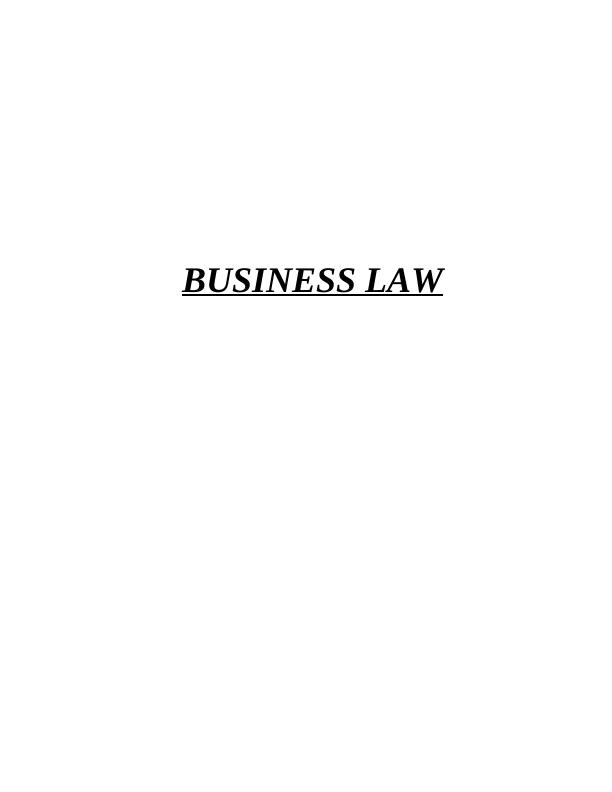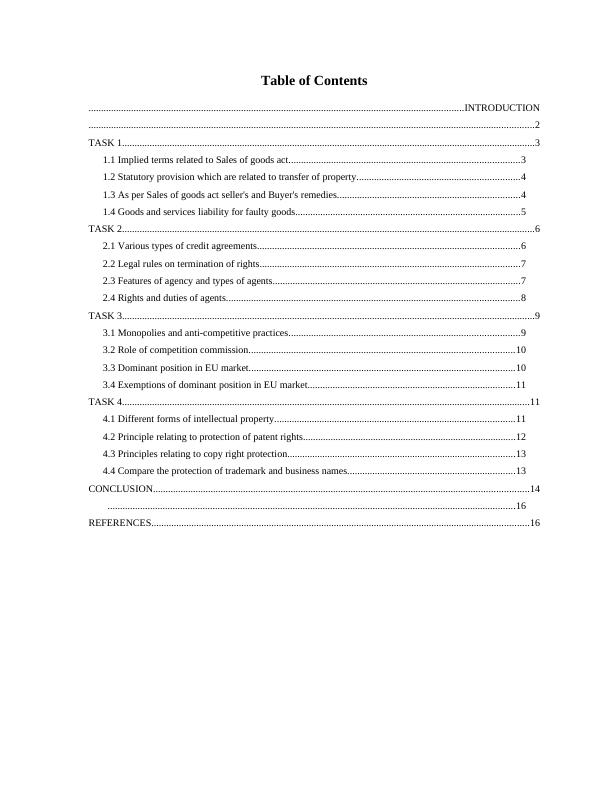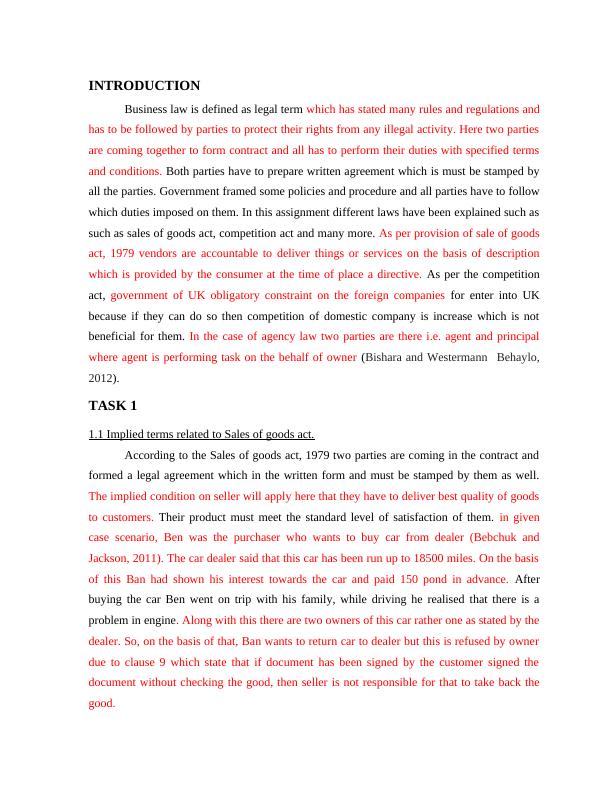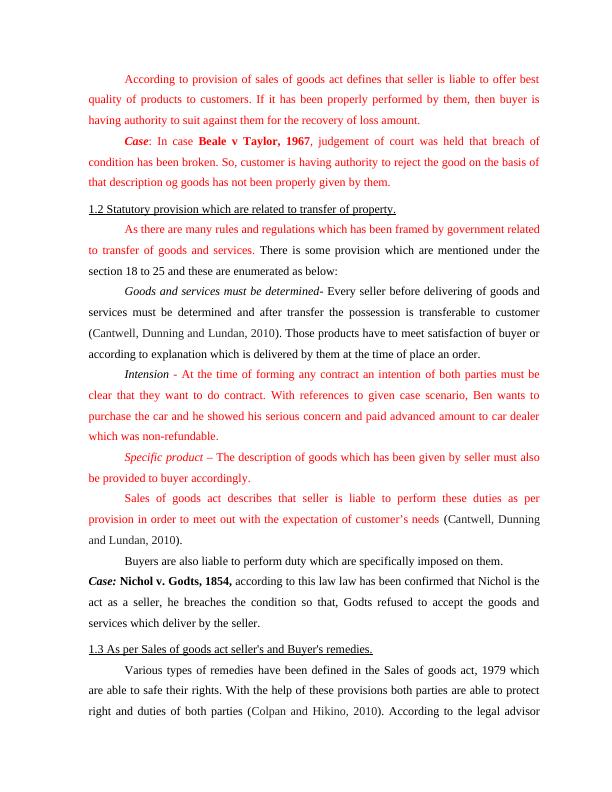Introduction to Business Law Assignment
17 Pages5192 Words52 Views
Added on 2020-01-28
Introduction to Business Law Assignment
Added on 2020-01-28
ShareRelated Documents
BUSINESS LAW

Table of Contents......................................................................................................................................................INTRODUCTION..................................................................................................................................................................................2TASK 1.....................................................................................................................................................................31.1 Implied terms related to Sales of goods act............................................................................................31.2 Statutory provision which are related to transfer of property.................................................................41.3 As per Sales of goods act seller's and Buyer's remedies.........................................................................41.4 Goods and services liability for faulty goods..........................................................................................5TASK 2.....................................................................................................................................................................62.1 Various types of credit agreements.........................................................................................................62.2 Legal rules on termination of rights........................................................................................................72.3 Features of agency and types of agents...................................................................................................72.4 Rights and duties of agents.....................................................................................................................8TASK 3.....................................................................................................................................................................93.1 Monopolies and anti-competitive practices............................................................................................93.2 Role of competition commission..........................................................................................................103.3 Dominant position in EU market..........................................................................................................103.4 Exemptions of dominant position in EU market...................................................................................11TASK 4...................................................................................................................................................................114.1 Different forms of intellectual property................................................................................................114.2 Principle relating to protection of patent rights.....................................................................................124.3 Principles relating to copy right protection...........................................................................................134.4 Compare the protection of trademark and business names...................................................................13CONCLUSION......................................................................................................................................................14...................................................................................................................................................................16REFERENCES.......................................................................................................................................................16

INTRODUCTIONBusiness law is defined as legal term which has stated many rules and regulations andhas to be followed by parties to protect their rights from any illegal activity. Here two partiesare coming together to form contract and all has to perform their duties with specified termsand conditions. Both parties have to prepare written agreement which is must be stamped byall the parties. Government framed some policies and procedure and all parties have to followwhich duties imposed on them. In this assignment different laws have been explained such assuch as sales of goods act, competition act and many more. As per provision of sale of goodsact, 1979 vendors are accountable to deliver things or services on the basis of descriptionwhich is provided by the consumer at the time of place a directive. As per the competitionact, government of UK obligatory constraint on the foreign companies for enter into UKbecause if they can do so then competition of domestic company is increase which is notbeneficial for them. In the case of agency law two parties are there i.e. agent and principalwhere agent is performing task on the behalf of owner (Bishara and Westermann‐Behaylo,2012). TASK 11.1 Implied terms related to Sales of goods act.According to the Sales of goods act, 1979 two parties are coming in the contract andformed a legal agreement which in the written form and must be stamped by them as well.The implied condition on seller will apply here that they have to deliver best quality of goodsto customers. Their product must meet the standard level of satisfaction of them. in givencase scenario, Ben was the purchaser who wants to buy car from dealer (Bebchuk andJackson, 2011). The car dealer said that this car has been run up to 18500 miles. On the basisof this Ban had shown his interest towards the car and paid 150 pond in advance. Afterbuying the car Ben went on trip with his family, while driving he realised that there is aproblem in engine. Along with this there are two owners of this car rather one as stated by thedealer. So, on the basis of that, Ban wants to return car to dealer but this is refused by ownerdue to clause 9 which state that if document has been signed by the customer signed thedocument without checking the good, then seller is not responsible for that to take back thegood.

According to provision of sales of goods act defines that seller is liable to offer bestquality of products to customers. If it has been properly performed by them, then buyer ishaving authority to suit against them for the recovery of loss amount.Case: In case Beale v Taylor, 1967, judgement of court was held that breach ofcondition has been broken. So, customer is having authority to reject the good on the basis ofthat description og goods has not been properly given by them. 1.2 Statutory provision which are related to transfer of property.As there are many rules and regulations which has been framed by government relatedto transfer of goods and services. There is some provision which are mentioned under thesection 18 to 25 and these are enumerated as below:Goods and services must be determined- Every seller before delivering of goods andservices must be determined and after transfer the possession is transferable to customer(Cantwell, Dunning and Lundan, 2010). Those products have to meet satisfaction of buyer oraccording to explanation which is delivered by them at the time of place an order. Intension - At the time of forming any contract an intention of both parties must beclear that they want to do contract. With references to given case scenario, Ben wants topurchase the car and he showed his serious concern and paid advanced amount to car dealerwhich was non-refundable. Specific product – The description of goods which has been given by seller must alsobe provided to buyer accordingly. Sales of goods act describes that seller is liable to perform these duties as perprovision in order to meet out with the expectation of customer’s needs (Cantwell, Dunningand Lundan, 2010). Buyers are also liable to perform duty which are specifically imposed on them.Case: Nichol v. Godts, 1854, according to this law law has been confirmed that Nichol is theact as a seller, he breaches the condition so that, Godts refused to accept the goods andservices which deliver by the seller. 1.3As per Sales of goods act seller's and Buyer's remedies.Various types of remedies have been defined in the Sales of goods act, 1979 whichare able to safe their rights. With the help of these provisions both parties are able to protectright and duties of both parties (Colpan and Hikino, 2010). According to the legal advisor

End of preview
Want to access all the pages? Upload your documents or become a member.
Related Documents
BUSINESS LAW INTRODUCTION 3 TASK 13 1.1 Implied Terms and Conditions of Sale of Goods Actlg...
|17
|5295
|471
Business Law- Sales of Goods Actlg...
|17
|5165
|37
BUSINESS LAW INTRODUCTION 3 TASK 13lg...
|16
|4464
|257
Report on Business Law and Organisational Lawslg...
|16
|5436
|440
Report on Act of Sales Good and Breach of Warrantylg...
|13
|4089
|162
Analyse and advice on statutory provisions in business lawlg...
|17
|6159
|291
